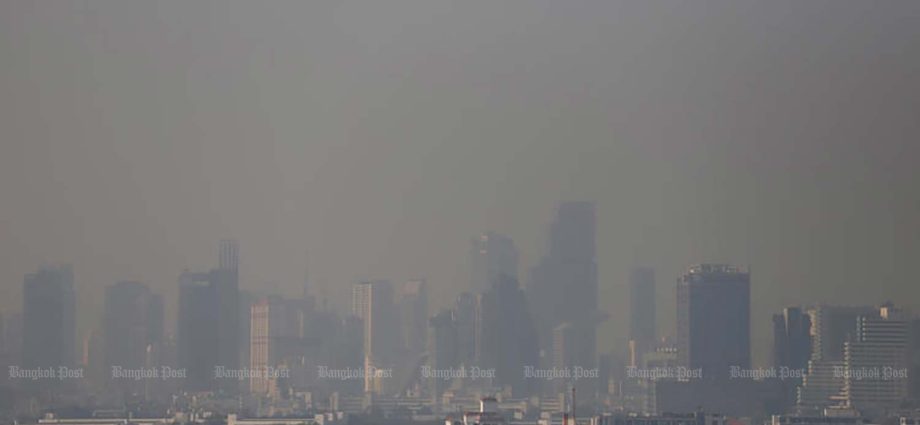Low air quality to persist for 2 days

Bangkok residents have been told to brace for rising levels of ultra-fine micropollutants in the air, which forecasters at the Pollution Control Department have said will continue to worsen until Wednesday.
The department is urging Bangkok residents to work from home until Wednesday to avoid the worst of the air pollution.
PCD director-general, Preeyaporn Suwanakate, said the rising concentration of PM2.5 pollutants is caused by poor air circulation in many areas of the capital, brought on by a combination of low atmospheric pressure and shifting wind patterns in the region. This has resulted in the accumulation of pollutants across many areas in the capital.
Prevailing winds from the South soon wlill make way for winds from the East and Northeast, bringing pollutants from other areas to Bangkok, she said.
In response to the department’s alert, the Bangkok Metropolitan Administration (BMA) is stepping up its inspections of all pollution sources in the capital. City Hall has also ordered schools to arrange “dust free” rooms at all kindergartens and schools under BMA’s supervision, she said.
State agencies and companies are also urged to allow their employees to work from home, as urban commuting is a major contributor to air pollution across the capital.
The government has also rolled out discounts of up to 55% for those who wish to replace their engine oil and oil filters as part of efforts to help curb pollution, she said.
Satellite images supplied by Thailand’s Geo-Informatics and Space Technology Development Agency (Gistda) detected 1,566 hotspots on Jan 9, 1,139 on Jan 10, and 1,023 on Jan 11.
Prime Minister Srettha Thavisin has been briefed on the situation and he plans to raise the issue when he meets his Cambodian counterpart, Hun Manet in Thailand on Feb 7, she said.
Mr Srettha had previously said Thailand and Cambodia will form a joint task force to fight transboundary haze pollution.
Ms Preeyaporn added that the Natural Resources and Environment Ministry has also asked Asean’s secretary-general to urge all countries in the Greater Mekong Subregion to prevent forest fires by cracking down on activities which contribute to transboundary haze, such as slash-and-burn farming.
Gistda is currently working with the National Research Council of Thailand, the Pollution Control Department, Kasetsart University and Chiang Mai University to monitor the PM2.5 situation in Bangkok.
As of 10am on Sunday, 33 districts in Bangkok reported seriously harmful pollution levels, with PM2.5 levels in those districts exceeding the PCD’s safe threshold for exposure of 37.5 µg/m³.
These districts included Phra Khanong, Don Muang, Lak Si, Bang Na, Prawet, Klong Toey, Suan Luang, and Sai Mai districts. PM2.5 levels in 34 other provinces — mainly in the North and Central Plains — also exceeded the safe standard.
In Chiang Mai, farmers have been encouraged to stick with just ploughing the soil to clear their rice fields before the upcoming planting season, instead of burning rice straw, which contributes to haze pollution.
Farmers who do not have tractors to plough are asked register on the “Fire-D” application, which was devised to monitor forest fires. Chiang Mai governor Nitirat Pongsitthithaworn said he has instructed agencies to arrange tractors for farmers who do not have them.
He also said a budget will also be allocated for them to buy fuel for the tractors, so they don’t have to resort to burning. He said he ordered the chiefs of 25 districts in the northern provinces to try to persuade farmers not to burn farmland.
Initially, the burning was expected to affect more than 100,000 rai of farmland but after negotiations, many farmers decided to change their minds and agreed to stop burning and use other methods to get rid of rice straw. “This will save more than 70,000 rai from fires,” the governor said.

